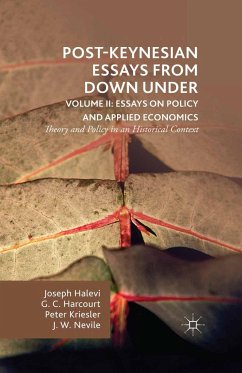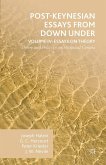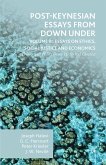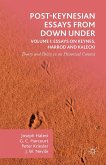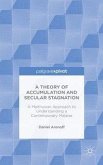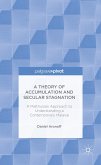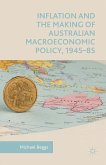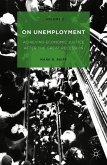Joseph Halevi, G. C. Harcourt, Peter Kriesler and J. W. Nevile bring together a collection of their most influential papers on post-Keynesian thought. Their work stresses the importance of the underlying institutional framework, of the economy as a historical process and, therefore, of path determinacy. In addition, their essays suggest the ultimate goal of economics is as a tool to inform policy and make the world a better place, with better being defined by an overriding concern with social justice.Volume II assess application and policies.
'The 29 incisive essays in this book will be of great interest not only to Australians but to everyone concerned with the constraints on progressive economic policy in a small open economy. The four distinguished authors cover a wide range of topics, from unemployment and inflation to financial crises and the economics of imperialism. In an age when old truths have been forgotten, and ancient fallacies revived, the lucid Post Keynesian arguments of Halevi, Harcourt, Kriesler and Nevile deserve to reach a very wide audience.'
J.E. King, La Trobe University and Federation University Australia, Australia
'With this second volume of Post-Keynesian Essays from Down Under Halevi, Harcourt, Kriesler and Nevile have provided us with yet another marvel of collective brilliance 'made in Australia': Spanning core policy debates across several decades and four continents, these influential papers are a tour de force in what sets apart Post-Keynesianism, at its best, from presently dominant economic paradigms: Policy analysis properly grounded in theory, theory properly grounded in history and both, applied and theoretical analyses, stringently focused on how best to improve the lives of ordinary people. A wonderful and inspiring read all around, full of small gems of historical detail and as utterly relevant now as at the various times of writing the individual contributions.'
Stephanie Blankenburg, Department of Economics, School of Oriental and African Studies (SOAS), UK
J.E. King, La Trobe University and Federation University Australia, Australia
'With this second volume of Post-Keynesian Essays from Down Under Halevi, Harcourt, Kriesler and Nevile have provided us with yet another marvel of collective brilliance 'made in Australia': Spanning core policy debates across several decades and four continents, these influential papers are a tour de force in what sets apart Post-Keynesianism, at its best, from presently dominant economic paradigms: Policy analysis properly grounded in theory, theory properly grounded in history and both, applied and theoretical analyses, stringently focused on how best to improve the lives of ordinary people. A wonderful and inspiring read all around, full of small gems of historical detail and as utterly relevant now as at the various times of writing the individual contributions.'
Stephanie Blankenburg, Department of Economics, School of Oriental and African Studies (SOAS), UK

